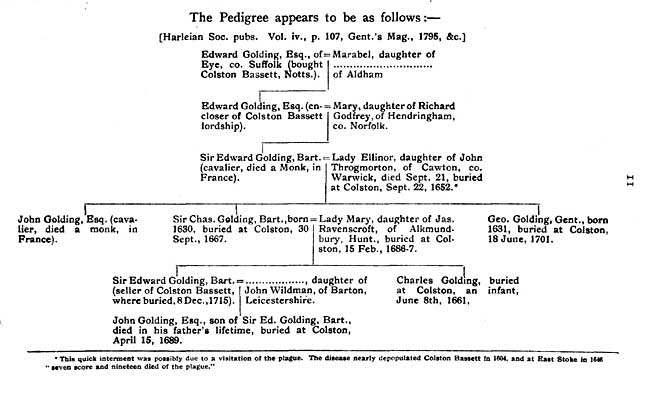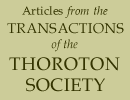Turning to "Mrs. Hutchinson's Memoirs of her husband" (who rendered substantial services to the cause of the Commons), we find her 1 writing as follows:—"All the Popish gentry were wholly for the king, whereof one, Mr. Golding, next neighbour to Mr. Hutchinson (Colston Bassett to Owthorpe), had been a private collector of the Catholics' contributions to the Irish Rebellion2 (against the English Parliament), and for that was, by the queen's procurement, made a Knight and a Baronet." This appears to have been the only mark of honour bestowed, at that early date of the war, upon any member of the county gentry.
Now comes the tug-of-war, in which we lose sight of Sir Edward Golding, Bart., and his son, John, but there is no doubt they gave good account of themselves, and for aught we know adopted the motto, "pro Deo et rege," worn to-day by the Goldings of Maiden Erlegh, Reading, Berkshire.
Before the king's cause was utterly lost, which may be dated as May 6th, 1646, with the surrender of Newark, Sir Edward and his son, John, had fled to France; for the heads of prominent partisans of the king were not secure upon their shoulders, and the chances of their lives were still more at a discount, if they happened to hold to the Pope.
Let us turn to Mrs. Chaworth Musters' historical romance, page 95, where she says, "Mr. Golding, of Colston Bassett, was created a Baronet, and he and his sons were among the loyal Catholics who fought for their king, 'with a halter round their necks,' for, incredible as it may seem, the fact of a man's being a 'Papist,' was a significant reason for giving him no quarter, and as the war proceeded, we find that as prisoners they were frequently put to death in cold blood."
A writer in "Notes and Queries," vol. ix., p. 336 (C.E.D.), says:—"Edward Golding, of Colston Bassett, and his son, John, were Capuchin Friars in Rouen (France) during the Commonwealth." Sir Edward Golding, Bart., and his son, John, appear to have ended their days in this peaceful seclusion, for we cannot trace their bones being gathered to those of their ancestors in Colston Bassett Church.
A writer in "The Gentleman's Magazine" for 1795, p. 234, gives the pedigree of Sir Edward Golding, Bart., founded on the registers and memorials of the church. He states that Lady Ellinor, Sir Edward's wife, died on the 21st of September, and was interred Colston Bassett on the 22nd September, 1652. This was during the Commonwealth, at which date it is not clear who held, or what became of, the estate. A Sir Chas. Golding Knt., was buried at Colston Bassett September 30th, 1667, aged thirty-seven. Twenty years after, a Lady Mary Golding, widow, was buried at Colston Bassett, February 15th, 1686.
A John Golding, son of Sir Edward Golding, was gathered to the home of his fathers on April 15th, 1689. Were it not that a contemporary Sir Edward Golding, Bart., was living, who died on December 6th, 1715, and was buried at Colston two days later, we might erroneously conclude that the above John was the old Capuchin Friar returned with more peaceful times to his old home. This contemporary Sir Edward, the last of the Nottinghamshire Goldings we are able to trace, sold the old family estate to the Wentworth family two years before his death,3 and with him the baronetcy became extinct.

(1) "Memoirs of Colonel Hutchinson," p. 117.
(2) This rebellion came to a head in 1641 under Phelim O'Neil, when
it is said forty thousand Protestant (English) Colonists were massacred
in Ulster.
(3) It is practically impossible to frame a correct pedigree of the Notts,
Goldings, as they only occur in the Colston Bassett Registers in the instance
of burials; their baptisms and marriages were conducted in private by Roman
priests. The Church Registers read "interred," whereas with all
other villagers the word "buried" occurs. This may possibly arise
from the Church of England service being dispensed with by the Goldings.
The following complete list of the entries of Burials in the Colston Bassett
Registers, together with the additional notes on the Golding family, have
been kindly furnished by Mr. T. M. Blagg, of Newark, the text in brackets
is mine:—
| 1. | The Lady Elianor Golding, wife of Sir Edward Golding [Bart.] | 22 September, 1652 |
| 2. | Mrs. Elianor Golding [Possibly a first wife of Mr. Geo. Golding] | 25 June, 1660 |
| 3. | Mr. Charles Golding [Infant son of Sir Charles Golding, Bart.] | 8 June,1661 |
| 4. | Sir Charles Golding [Bart.] [Died aged 37 years] | 30 September, 1667 |
| 5. | Mrs. Elizabeth Golding [Possibly a second wife of Mr. Geo. Golding;] | 2 August, 1685 |
| 6. | The Lady Mary Golding, widow [Widow of Sir Charles Golding] | 15 February, 1686-7 |
| 7. | John, son of Sir Edward Golding, Bart. ... [Died in his father's lifetime] | 15 April, 1689 |
| 8. | Mr. George Golding, Gentlemen [Born 1631, son of Sir Edward Golding, the Cavalier] | 18 June, 1701 |
The old church and its memorials share the decay of this cavalier family. As monumental ruins they stand away in the fields, a newer church, in a more central position having been erected a few years ago.
| 9. | Sir Edward Golding, Bart. ... ... 8 December, 1715 [The last of the Baronets] |
| 1651. | Letters from the County Committee for Notts, to the Committee for
compounding We annex a particular of all persons under sequestration in the county
as requested. . . . Papists 2/3 sequestered. Sir Edward Goulding, Colston Bassett." (Calendar of the proceedings of the Committee for compounding,&c., 1643-1660. p. 535. |
| 1696. | June 6. "A list of persons summoned to take the oaths at
Nottingham at the Easter sessions who were all reputed
papists, and did not appear:— Sir Edward Golding of Carcolston (Colston Bassett ?)" (Duke of Portland's MSS., at Welbeck Abbey, vol. it., p. 176). "Duke of Newcastle to the Privy Council, enclosing an account of the horses seized, because the persons to whom they belonged had refused to take the oaths:— Sir Edward Golding of Carcolston (Colston Bassett ?) 2 horses. (do. do.)" |
